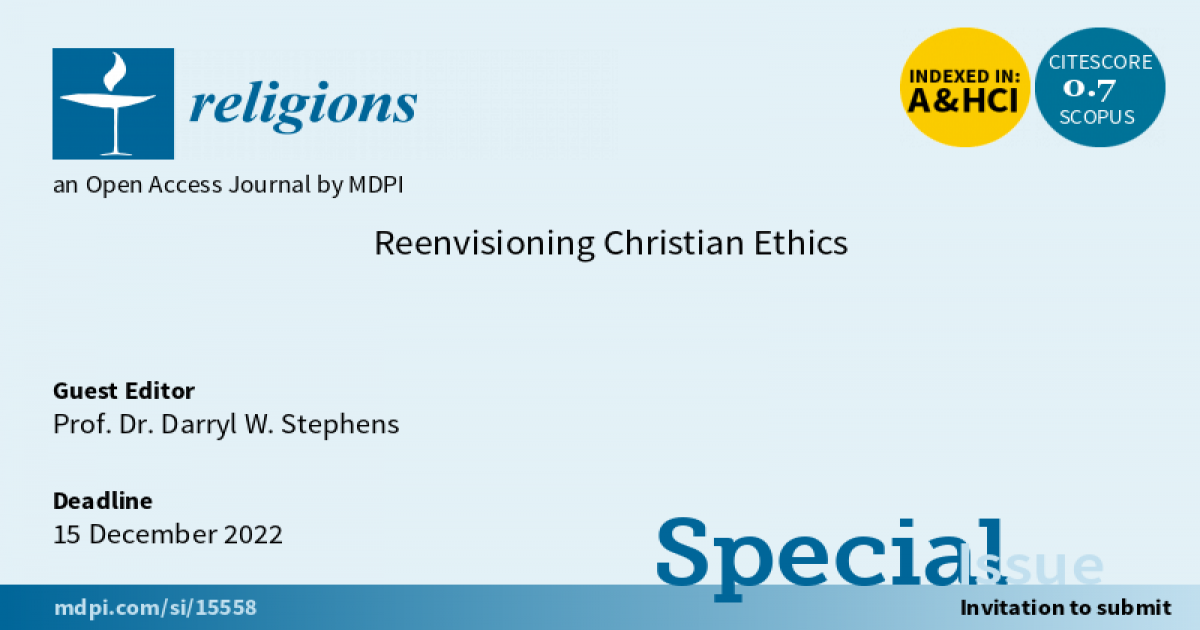- 0.6Impact Factor
- 1.3CiteScore
- 26 daysTime to First Decision
Reenvisioning Christian Ethics
Special Issue Information
Dear Colleagues,
I first issued a call to scholars to reenvision the field of Christian ethics in April 2018. The resulting conversation proved thought-provoking and timely. The high quality of published papers from that collection are inspiring. Yet, the world looks quite different now, three and a half years later. In the face of multiple global pandemics and widespread political disruption, we need to continue the task of reenvisioning Christian ethics. Thus, I am renewing the call to Christian ethicists. I am pleased to announce that this special issue of the journal Religions is once again open for submissions.
Christian ethics is a wide, varied field. So diverse are the methods and approaches, theological perspectives and starting points, and scopes of inquiry and purposes—dare we even call it a “discipline”?—that the field is rarely considered as a whole. Christian ethics includes descriptive, critical, constructive, and applied projects on countless topics. Lending creative energy to this field of scholarly endeavor are a range of partner disciplines, including, most prominently, theology, philosophy, and sociology—each with multiple schools of thought within them. To envision the entire field of Christian ethics is a difficult task; to reenvision the entire field, perhaps impossible for one person. Thus, in this special issue on Reenvisioning Christian Ethics, we invite papers that offer a distinct perspective from their primary partner discipline for the purpose of contributing to a composite reenvisioning of the field.
The purpose of this special issue of Religions is to reenvision Christian ethics by refracting our collective vision through the prisms of diverse academic and methodological perspectives in this vast field of inquiry, study, and practice.
The scope of this special issue is necessarily broad, though each individual contribution should be well-focused, indicating how advances and insights from one location might effectively contribute to or prompt new developments in other locations in this field. Each paper should provide a vision of the field of Christian ethics from a distinct perspective, as follows: identify its primary partner discipline, method and approach, theological perspective and starting point, and scope of inquiry and purpose; name key insights developed from that perspective; describe ways in which this perspective has impacted other perspectives and approaches in the field; and suggest ways to reenvision Christian ethics through these perspectival insights.
Prof. Dr. Darryl W. Stephens
Guest Editor
Manuscript Submission Information
Manuscripts should be submitted online at www.mdpi.com by registering and logging in to this website. Once you are registered, click here to go to the submission form. Manuscripts can be submitted until the deadline. All submissions that pass pre-check are peer-reviewed. Accepted papers will be published continuously in the journal (as soon as accepted) and will be listed together on the special issue website. Research articles, review articles as well as short communications are invited. For planned papers, a title and short abstract (about 250 words) can be sent to the Editorial Office for assessment.
Submitted manuscripts should not have been published previously, nor be under consideration for publication elsewhere (except conference proceedings papers). All manuscripts are thoroughly refereed through a double-blind peer-review process. A guide for authors and other relevant information for submission of manuscripts is available on the Instructions for Authors page. Religions is an international peer-reviewed open access monthly journal published by MDPI.
Please visit the Instructions for Authors page before submitting a manuscript. The Article Processing Charge (APC) for publication in this open access journal is 1800 CHF (Swiss Francs). Submitted papers should be well formatted and use good English. Authors may use MDPI's English editing service prior to publication or during author revisions.
Keywords
- Christian ethics
- theological ethics
- moral theology
- social ethics
- philosophical ethics

Benefits of Publishing in a Special Issue
- Ease of navigation: Grouping papers by topic helps scholars navigate broad scope journals more efficiently.
- Greater discoverability: Special Issues support the reach and impact of scientific research. Articles in Special Issues are more discoverable and cited more frequently.
- Expansion of research network: Special Issues facilitate connections among authors, fostering scientific collaborations.
- External promotion: Articles in Special Issues are often promoted through the journal's social media, increasing their visibility.
- e-Book format: Special Issues with more than 10 articles can be published as dedicated e-books, ensuring wide and rapid dissemination.

